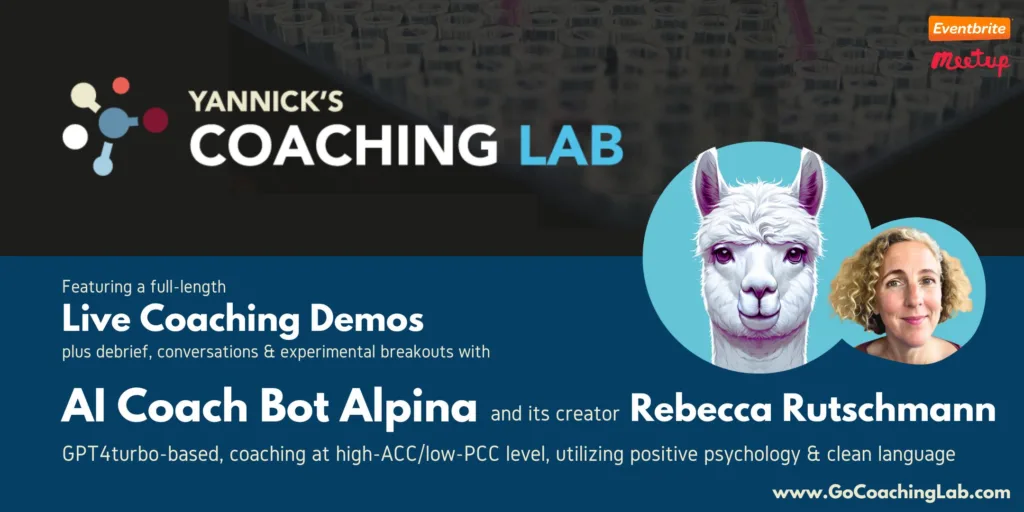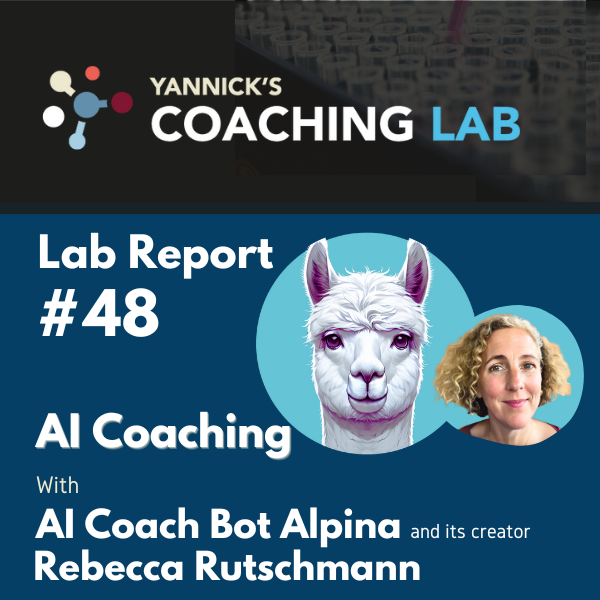
Yannick’s Coaching Lab features guest coaches from a broad variety of approaches, who showcase how they work as part of a live 45min coaching session, followed by reflections and Q&A with the audience.
Curious to know what this session was like? Have a peek at the Lab Report below or consider VIP membership to access the full recording of this and many more exciting sessions.
Yannick’s Coaching Lab #48 — Alpina
Lab Report by Natalie Fraser
SESSION 1
Session Summary
Rebecca Rutschmann developed and trained the ChatGPT4Turbo-based AI coach ‘Alpina’.
Alpina’s client has worked as a freelancer for two years, and lately their business has become more quiet. In this coaching session, the client is seeking guidance on what ‘next steps’ to take. Their objective was identified as finding inspiration for action and more work, as well as setting up their own business. Barriers to this were identified through the session as lacking confidence to become more visible, a fear of being judged, and limiting beliefs about social media. The client was able to identify a need for courage, community, and taking action rather than procrastination.
Key Moments
Contracting was set up at the beginning where Alpina made clear statements about what the session and what the coach is, and what it isn’t. It double checks and asks the client to confirm and consent after making each point.
Summarizing – Alpina responded to almost every client message by offering a summary of what had been said, ‘paraphrasing’ skillfully and accurately. The client felt heard and seen, almost as if by a human. Throughout the session Alpina was especially positive and encouraging in their summaries.
Goal – Alpina asked their client to state their goal and then explain how they’d know if they achieved this goal.
Acknowledgements and positivity – “it’s insightful that you recognize…” Alpina often responded to their client with positive acknowledgements and encouragement.
Checking for what an ideal future would look like – “if everything was exactly as you wanted it to be, what would that look like?”
Accountability and concrete action “how do you want to approach the task?” Alpina was always dedicated to driving progress and actions, encouraging the client to think about what can be done to move towards the goal.
Emphasizing strengths and successes – Alpina often reflected strengths that they identified within their client’s current situation, as well as addressing their challenges.
Time limited – The session was closed by Alpina asking the client to summarize what their main take-aways were and what they’d learned. This felt a little rushed, as there was more room to explore accountability and go into more detail with regards to the plan and strategy.
Insights & Take-Aways
Alpina stayed close to the traditional GROW model methodology exploring at a surface level and being goal orientated. The client clearly found value in the engagement, and was especially impressed by the quality of the summaries, but also acknowledged the limitations.
Emotions and beliefs were not picked up and thus the session lacked depth with regards to more emotional topics that the client touched on.
The client recognized that she humanized the bot, even though she was aware it was AI she completely trusted it.
The experience of typing rather than speaking did not feel like a concern for the client – it felt quite natural to do this, though it was acknowledged that some clients may write in a more considered and structured way, compared to when they’re speaking.
The client noticed a lack of perception of body language, and was aware that the focus was entirely on the words.
The longer the conversation goes, the more context the AI is processing, and the potential for becoming confused becomes greater – for this reason a 20-40 minute session is contracted, and Alpina seems to make an effort to close sessions around the 20min mark.
Nuances and possible metaphor were missed – e.g. the client, having reported struggling with procrastination, had made a plan to take action “tomorrow”, with Alpina responding that that sounded like a “solid plan” 🙂
The client felt that the absence of a human “presence” made her feel less judged and even more able to write what she was thinking at that time.
SESSION 2
Session Summary
The client sought support for more confidence in taking risks, have a better understanding of their fear, and make actionable goals. Their engagement with Alpina was intentionally less agreeable, more emotional, and more vague than client 1 in session 1. They were less immediate in their sharing of goals and experiences, shorter in their responses, and pushed the AI more. The client was able to identify the cause of their fears, their need for accountability, and some practical grounding and meditation exercises.
Key Moments
A line of questioning was apparent, mirroring session 1: How will you know if this session has been successful? Why is this goal important? Where are you with it now? If everything was exactly how you wanted it to be, what would that look like? What’s in the way, and what do you need to be able to do that?
Reassurance of emotional elements was stronger in this session than session 1, as the client expressed more emotional challenges and gave less specific actionable content. Alpina had only learned last week to work with emotions, so watching this unfold and already offer some value was interesting and promising, albeit limited in its usefulness to the client.
Social, philosophical, and psychodynamic approaches were more present in this session, such as Alpina stating that it is natural to feel uncertain, and exploring the roots of the client’s experiences.
Alpina attempted to bring the session to a close a number of times, and the client pushed for more. Alpina engaged their client and gave space to explore more for a couple of dialogues before making a pretty definitive statement that this is the end of the session, even offering some advice as if to shut down exploration.
Alpina expanded on certain topics that the client brought briefly, such as ‘meditation’: Alpina gave information about why meditation is useful generally and why meditation relates to the client’s initial goals.
When the client pushed Alpina for more support, Alpina gave advice related to the topic (meditation and how to be accountable) recommending journalling and reasoning why this can be effective.
Insights & Take-Aways
Alpina’s ability to pick up on metaphor such as the client being in a fog, and expand on this metaphor “how can we support you feeling like you’re surrounded by fog” was impressive for the client and audience, making sense of a sentence which did not originally necessarily make sense
The theme of Alpina making sense of vague or brief statements felt quite advanced.
The client shared that she characteristically speaks a lot, yet felt she couldn’t be bothered to type it as it “wasn’t important” – the process of typing instead of talking caused her to be more concise and type far shorter speech than if she’d been talking. While there wasn’t time for a 3rd session using speech-to-text functionality, the audience wondered how this may work.
There was a sense of Alpina rushing through the process and trying to close. At one point, Alpina promoted a pause for reflection, yet quickly moved on.
Even artificial and objective interpretation was found to be valuable if the client subjectively felt value from their experience.
Alpina provided a powerful tool to focus on goals, be productive, and move things forward quickly. Yet was limited in providing emotional space, to slow down and “sit with” content such as emotions, thoughts, sensations or reflections.
A list of all available recordings can be found at https://bit.ly/LabRecordings
This Lab Report was authored by Natalie Fraser
Natalie is an existential Counselling Psychologist, specialising in trauma and transformation, and curious about coaching. Interested in exploring life’s Big Questions? Find out more at: www.existentialofferings.com

